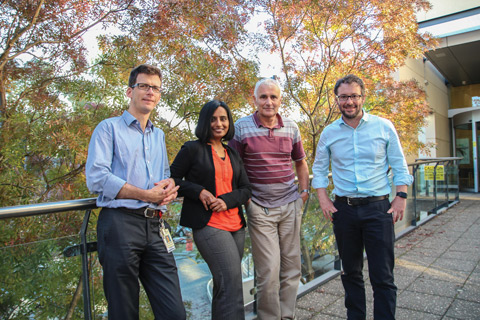Search
Research
Timeliness of signal detection for adverse events following influenza vaccination in young children: a simulation case studyActive vaccine safety surveillance leading to rapid detection of a safety signal would likely have resulted in earlier suspension of Fluvax from the vaccination programme
Research
Birth outcomes in Aboriginal mother–infant pairs from the Northern Territory, Australia, who received 23-valent polysaccharide pneumococcal vaccination during pregnancyWe found a numerically higher rate of preterm births among women who received 23vPPV in pregnancy compared to unvaccinated pregnant women
Research
Are there differences in immune responses following delivery of vaccines through acutely or chronically sun-exposed compared with sun-unexposed skin?The review provides the basis for further research into the effects of acute and chronic UV radiation exposure on skin cells in the context of vaccination
Research
SCN1A Variants in vaccine-related febrile seizures: A prospective studyPathogenic SCN1A variants may be identified in infants with vaccine-proximate febrile seizures
Research
Vaccine decision-making begins in pregnancy: Correlation between vaccine concerns, intentions and maternal vaccination with subsequent childhood vaccine uptakeAmongst pregnant Australian women we aimed to ascertain vaccine information received, maternal immunisation uptake and attitudes and concerns regarding vaccines

News & Events
Pioneering technique opens new window on first week of lifeAn international team of researchers has pioneered a technique which gives unprecedented insight into the dramatic changes occurring in a baby’s body in the first week of life.

News & Events
Australian parents oblivious to true danger of the fluNew research investigating the devastating impact of the 2017 flu season by PAEDS-FluCAN, a national collaboration observing influenza in children, confirmed it was time to take action after thousands of children were hospitalised with the virus last year.

News & Events
Institute celebrates eradication of rubella in AustraliaThe eradication of rubella in Australia is evidence of the vital role vaccinations play in protecting our health, researchers at The Kids Research Institute Australia say.

News & Events
Vaccine surveillance brings safety reassuranceIn 2010, a large number of children experienced febrile convulsions after receiving the FluVax vaccination and many parents began to question its safety.
News & Events
Time running out to prepare for flu seasonPeople are being urged to ensure they've had their vaccination with the 'flu season expected to hit in Western Australia within weeks.
